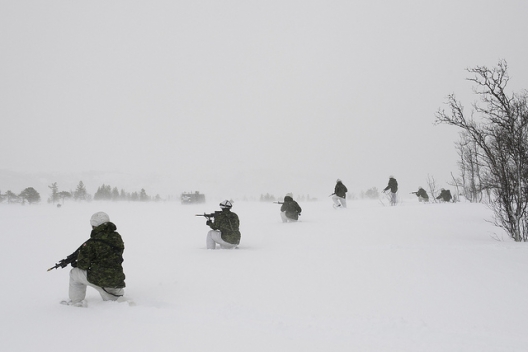 When Russian warplanes staged a mock bombing run on Sweden last year, air defences were caught napping. It was the middle of the night and no Swedish planes were scrambled.
When Russian warplanes staged a mock bombing run on Sweden last year, air defences were caught napping. It was the middle of the night and no Swedish planes were scrambled.
Instead, Danish jets belonging to NATO’s Baltic mission based in Lithuania, took to the air to shadow the Russians.
The discussion that incident triggered over Sweden’s ability to defend itself has grown with Russia’s seizure of Crimea from Ukraine. As in neighbour and fellow EU member Finland, Swedes wonder whether to seek shelter in the U.S.-led NATO alliance, abandoning Stockholm’s two centuries of formal neutrality. . . .
For all the scepticism about NATO, however, worries have been growing in Scandinavia since Russia’s action in Crimea.
Russian troops held exercises on the Finnish border this week. A former aide to Vladimir Putin made waves by saying that, after ex-Soviet Ukraine, the president might eye Finland next.
Both Nordic nations may bolster defence spending and forge a closer military partnership between themselves as they face Russia across the Baltic and along Finland’s long land border.
So far neither has risked finding out what Prime Minister Dmitry Medvedev meant when he said last year that Finnish or Swedish NATO membership would force Moscow to “respond. . . .”
“I think it would be good to have an open debate about NATO already now and I hope that everyone would participate in it, even those who oppose the membership,” Finnish Prime Minister Jyrki Katainen told online newspaper Verkkouutiset last week.
In a sign of the times, while Finland cut unemployment and child benefits in a March budget, defence got off lightly.
Swedish Deputy Prime Minister Jan Bjorklund called last month for a “doctrinal shift” in defence policy after the Crimea crisis. Calling Russia “a bit more erratic and unpredictable”, Finance Minister Anders Borg called for “a substantial scaling up” of defence spending.
Borg’s statement came after Sweden moved two fighter jets to Gotland, a strategically important Baltic island where spending cuts in recent years had all but eliminated defences.
Sweden’s defence spending fell to 1.2 percent of GDP in 2012, according to the Stockholm-based SIPRI think tank, compared with 2 percent at the turn of the century.
Rather than join NATO, the Ukraine crisis may see Sweden and Finland more active in the Nordic Defence Cooperation – NORDEFCO – with the three Nordic states which are in the alliance. . . .
Polls show a clear majority oppose NATO membership in Sweden and Finland. About a third of Swedes favour joining the alliance and only around a fifth of Finns.
“There is no public support for NATO membership and Sweden has greater freedom to act if we’re not part of NATO,” said Peter Hultqvist, who chairs the parliamentary defence committee.
“There is a belief that our tradition of staying outside military alliances is the best way to preserve peace,” he said, before adding a note of caution: “We must strive for an improvement of our military strength.”
Image: Cold Response 2012 exercise (photo: Cpl Stuart MacNeil/Canadian Ministry of Defense)
